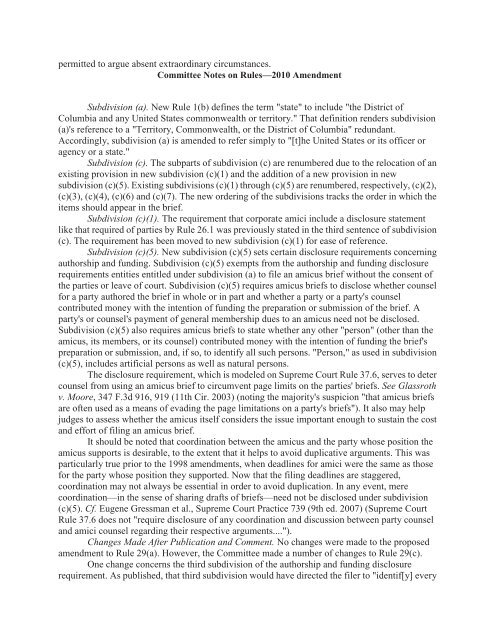Federal Rules of Appellate Procedure 2014-2015, 2014a
Federal Rules of Appellate Procedure 2014-2015, 2014a
Federal Rules of Appellate Procedure 2014-2015, 2014a
You also want an ePaper? Increase the reach of your titles
YUMPU automatically turns print PDFs into web optimized ePapers that Google loves.
permitted to argue absent extraordinary circumstances.<br />
Committee Notes on <strong>Rules</strong>—2010 Amendment<br />
Subdivision (a). New Rule 1(b) defines the term "state" to include "the District <strong>of</strong><br />
Columbia and any United States commonwealth or territory." That definition renders subdivision<br />
(a)'s reference to a "Territory, Commonwealth, or the District <strong>of</strong> Columbia" redundant.<br />
Accordingly, subdivision (a) is amended to refer simply to "[t]he United States or its <strong>of</strong>ficer or<br />
agency or a state."<br />
Subdivision (c). The subparts <strong>of</strong> subdivision (c) are renumbered due to the relocation <strong>of</strong> an<br />
existing provision in new subdivision (c)(1) and the addition <strong>of</strong> a new provision in new<br />
subdivision (c)(5). Existing subdivisions (c)(1) through (c)(5) are renumbered, respectively, (c)(2),<br />
(c)(3), (c)(4), (c)(6) and (c)(7). The new ordering <strong>of</strong> the subdivisions tracks the order in which the<br />
items should appear in the brief.<br />
Subdivision (c)(1). The requirement that corporate amici include a disclosure statement<br />
like that required <strong>of</strong> parties by Rule 26.1 was previously stated in the third sentence <strong>of</strong> subdivision<br />
(c). The requirement has been moved to new subdivision (c)(1) for ease <strong>of</strong> reference.<br />
Subdivision (c)(5). New subdivision (c)(5) sets certain disclosure requirements concerning<br />
authorship and funding. Subdivision (c)(5) exempts from the authorship and funding disclosure<br />
requirements entities entitled under subdivision (a) to file an amicus brief without the consent <strong>of</strong><br />
the parties or leave <strong>of</strong> court. Subdivision (c)(5) requires amicus briefs to disclose whether counsel<br />
for a party authored the brief in whole or in part and whether a party or a party's counsel<br />
contributed money with the intention <strong>of</strong> funding the preparation or submission <strong>of</strong> the brief. A<br />
party's or counsel's payment <strong>of</strong> general membership dues to an amicus need not be disclosed.<br />
Subdivision (c)(5) also requires amicus briefs to state whether any other "person" (other than the<br />
amicus, its members, or its counsel) contributed money with the intention <strong>of</strong> funding the brief's<br />
preparation or submission, and, if so, to identify all such persons. "Person," as used in subdivision<br />
(c)(5), includes artificial persons as well as natural persons.<br />
The disclosure requirement, which is modeled on Supreme Court Rule 37.6, serves to deter<br />
counsel from using an amicus brief to circumvent page limits on the parties' briefs. See Glassroth<br />
v. Moore, 347 F.3d 916, 919 (11th Cir. 2003) (noting the majority's suspicion "that amicus briefs<br />
are <strong>of</strong>ten used as a means <strong>of</strong> evading the page limitations on a party's briefs"). It also may help<br />
judges to assess whether the amicus itself considers the issue important enough to sustain the cost<br />
and effort <strong>of</strong> filing an amicus brief.<br />
It should be noted that coordination between the amicus and the party whose position the<br />
amicus supports is desirable, to the extent that it helps to avoid duplicative arguments. This was<br />
particularly true prior to the 1998 amendments, when deadlines for amici were the same as those<br />
for the party whose position they supported. Now that the filing deadlines are staggered,<br />
coordination may not always be essential in order to avoid duplication. In any event, mere<br />
coordination—in the sense <strong>of</strong> sharing drafts <strong>of</strong> briefs—need not be disclosed under subdivision<br />
(c)(5). Cf. Eugene Gressman et al., Supreme Court Practice 739 (9th ed. 2007) (Supreme Court<br />
Rule 37.6 does not "require disclosure <strong>of</strong> any coordination and discussion between party counsel<br />
and amici counsel regarding their respective arguments....").<br />
Changes Made After Publication and Comment. No changes were made to the proposed<br />
amendment to Rule 29(a). However, the Committee made a number <strong>of</strong> changes to Rule 29(c).<br />
One change concerns the third subdivision <strong>of</strong> the authorship and funding disclosure<br />
requirement. As published, that third subdivision would have directed the filer to "identif[y] every


















